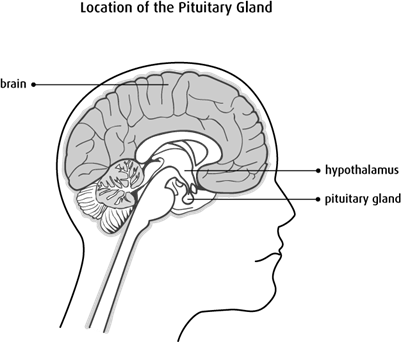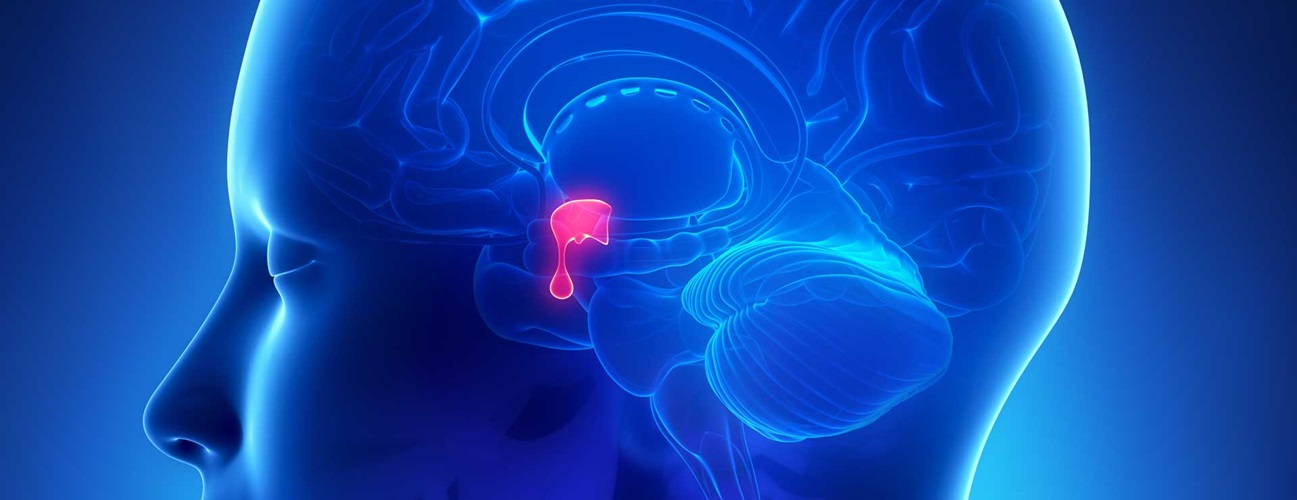The pituitary gland (PG) is said to be a “master” endocrine gland and through its tropic hormones influences other endocrine glands to secrete hormones that have a variety of effects on body systems.The anatomist Samuel Thomas von Sömmerring coined the name hypophysis.This name consists of ὑπό (‘under’) and φύειν (‘to grow’). In later Greek ὑπόφυσις is used differently by Greek physicians as outgrowth. Sömmering also used the equivalent expression appendix cerebri, with appendix as appendage. In various languages, Hirnanhang in German and hersenaanhangsel in Dutch, the terms are derived from appendix cerebri.
The height of the pituitary gland ranges from 5.3 to 7.0 mm. The volume o pituitary gland ranges from 200 to 440 mm.
The pituitary gland, in humans, is oval in shape and is a pea-sized gland that sits in a protective bony enclosure called the sella turcica. It is composed of two lobes: anterior and posterior, with the intermediate lobe that joins the two regions. In many animals, these three lobes are distinct. The intermediate is avascular and almost absent in human beings. The intermediate lobe is present in many animal species, in particular in rodents, mice and rats, that have been used extensively to study pituitary development and function. In all animals, the fleshy, glandular anterior pituitary is distinct from the neural composition of the posterior pituitary, which is an extension of the hypothalamus.

Pituitary gland anatomy :
The pituitary gland is within the sella turcica or the hypophyseal fossa. This structure is present near the center at the base of the cranium and is fibro-osseous. The anatomical boundaries of the gland have clinical and surgical significance. Sella turcica is a concave indentation in the sphenoid bone.
In most species the pituitary gland is divided into three lobes: the anterior lobe, the intermediate lobe, and the posterior lobe (also called the neurohypophysis or pars nervosa).
pituitary gland Hormones :
Hormones secreted from the pituitary gland help control the following body processes:
Growth (GH)
Blood pressure
Some aspects of pregnancy and childbirth including stimulation of uterine contractions
Breast milk production
Sex organ functions in both sexes
Thyroid gland function
Metabolic conversion of food into energy
Water and osmolarity regulation in the body
Water balance via the control of reabsorption of water by the kidneys
Temperature regulation
Pain relief
The pituitary gland is found in all vertebrates, but its structure varies among different groups.The intermediate lobe is, in general, not well developed in tetrapods, and is entirely absent in birds.
pituitary insufficiency:
Hypopituitarism (also called pituitary insufficiency) is a rare condition in which the pituitary gland doesn’t make enough of certain hormones. Hypopituitarism can develop suddenly after surgery, injury, or bleeding, or very slowly, over several months or even over several years.
pituitary insufficiency symptoms: Adrenocorticotropic hormone (ACTH) deficiency . Severe fatigue. Low blood pressure, which may lead to fainting. Frequent and prolonged infections. Nausea, vomiting or abdominal pain
Pituitary gland tumor:
Pituitary tumors are abnormal growths that develop in your pituitary gland. Some pituitary tumors result in too much of the hormones that regulate important functions of your body. Some pituitary tumors can cause your pituitary gland to produce lower levels of hormones.Pituitary cancer is very rare. Still, the tumors can cause serious problems, either because of their size (large tumors) or because they make extra hormones your body doesn’t need (functioning tumors). They’re typically treated with surgery, medicine, or radiation
Pituitary gland for Frequently Asked Questions ؟
What is function of pituitary gland?
Your pituitary gland is an important pea-sized organ. If your pituitary gland doesn’t function properly, it affects vital parts like your brain, skin, energy, mood, reproductive organs, vision, growth and more. It’s the “master” gland because it tells other glands to release hormones.
Can you live without a pituitary gland?
The pituitary gland is called the master gland of the endocrine system. This is because it controls many other hormone glands in the body. According to The Pituitary Foundation, without it, the body wouldn’t reproduce, wouldn’t grow properly and many other bodily functions just wouldn’t function.
How can I improve my pituitary function?
eating a diet rich in fruits and vegetables, which are great sources of fiber, vitamins, and minerals.choosing good sources of fats, such as those that contain omega-3 fatty acids and monounsaturated fats.
What are pituitary symptoms?
Change hormone production, leading to symptoms such as weight gain, stunted or excessive growth, high blood pressure, low sex drive or mood changes. Press against the pituitary gland, optic nerves or brain tissue, causing vision problems or headaches.
Is a pituitary tumor serious?
Pituitary cancer is very rare. Still, the tumors can cause serious problems, either because of their size (large tumors) or because they make extra hormones your body doesn’t need (functioning tumors). They’re typically treated with surgery, medicine, or radiation.
Is pituitary tumor curable?
Most pituitary tumors are curable. If a pituitary tumor is diagnosed early, the outlook for recovery is usually excellent. However, if tumors grow large enough, or grow rapidly, they are more likely to cause problems and will be more difficult to treat.










